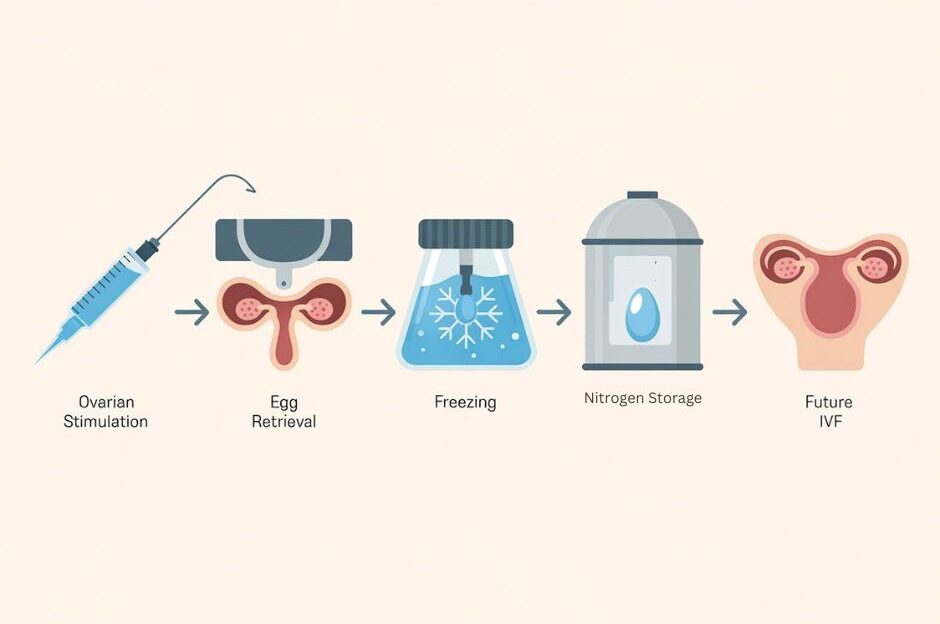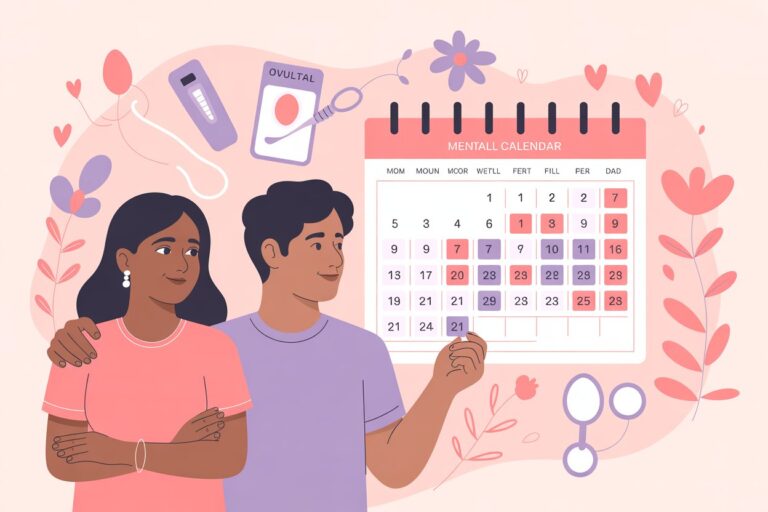In recent years, more women have started exploring modern fertility preservation methods, and one term that often comes up is egg freezing. If you’ve been wondering what is egg freezing and whether it is the right choice for you, you are not alone. With changing lifestyles, career priorities, and social shifts, Indian women today face unique challenges when it comes to planning motherhood. But is egg freezing really a solution? Let’s break it down in simple terms.
What is Egg Freezing?
Egg freezing, also called oocyte cryopreservation, is a medical process where a woman’s eggs are extracted, frozen, and stored for future use. Later, when she decides to have children, the frozen eggs can be thawed, fertilized with sperm, and implanted through in-vitro fertilization (IVF).
(For a detailed medical overview, you can refer to the American Society for Reproductive Medicine’s guide on egg freezing.)
The idea behind egg freezing is to “pause the biological clock.” A woman is born with a limited number of eggs, and as she ages, both the quality and quantity decline. By freezing eggs at a younger age, women can preserve healthier eggs for when they are ready for motherhood.
In short, what is egg freezing? It’s a way to secure future fertility options when the present isn’t the right time for pregnancy.
Why Are Indian Women Considering Egg Freezing?
Traditionally, Indian society has tied a woman’s fertility timeline closely to marriage and family expectations. But today’s scenario is different:
- Career Priorities: Many women want to establish their careers before starting a family.
- Late Marriages: Urban women are marrying later compared to earlier generations.
- Health Concerns: Conditions like PCOS, endometriosis, or cancer treatments can affect fertility.
- Personal Choice: Some women may not have found the right partner yet but still wish to preserve the option of biological motherhood.
For these reasons, egg freezing is slowly becoming part of fertility discussions in India’s metros and Tier-1 cities
Benefits of Egg Freezing
- Preserves Fertility with Age
- A woman’s egg quality declines after 35. Freezing eggs at a younger age allows her to use healthier eggs later, increasing chances of pregnancy.
- Gives Flexibility in Family Planning
- Women can focus on careers, education, or personal goals without feeling pressured by their biological clock.
- Helpful for Medical Reasons
- Women undergoing treatments like chemotherapy or radiation (which may harm fertility) can preserve eggs beforehand.
- Also useful for conditions like endometriosis, PCOS, or family history of early menopause.
- Peace of Mind
- Knowing that eggs are preserved can reduce anxiety about future fertility and give women more control over their reproductive choices.
- Option for Delayed Motherhood Without Compromise
- Women who haven’t found the right partner or aren’t ready for pregnancy yet can still keep the option of having a biological child later.
- Supports Single Parenthood or Donor Choices
- Frozen eggs can later be used with donor sperm if a woman chooses to be a single parent or needs assisted reproductive methods.
The Egg Freezing Process: Step by Step
If you’re wondering what is egg freezing like in practice, here’s a simplified overview of the process:
- Initial Consultation
A fertility specialist will evaluate your ovarian reserve (egg count), age, and overall health through blood tests and ultrasounds. - Ovarian Stimulation
For about 10–12 days, hormonal injections are given to stimulate the ovaries to produce multiple mature eggs. - Egg Retrieval
Under anesthesia, eggs are collected using a minor surgical procedure. - Freezing (Vitrification)
The eggs are rapidly frozen using advanced technology to prevent ice crystals from damaging them. - Storage
Eggs are stored in specialized liquid nitrogen tanks until the woman decides to use them.
This entire process typically takes around 2–3 weeks.

Ideal Age for Egg Freezing
Experts suggest that the best time to freeze eggs is between the ages of 25 and 35. Egg quality declines sharply after 35, so younger eggs have a higher chance of success when used later.
However, every woman’s fertility is unique, and tests like AMH (Anti-Müllerian Hormone) can help assess whether egg freezing is suitable at a given age.
Success Rates: Does Egg Freezing Really Work?
Many women worry whether freezing eggs today will actually result in a healthy pregnancy years later. The truth is, egg freezing is not a 100% guarantee, but it significantly improves the chances of conception when done at the right age and under the right medical guidance. Let’s look at the factors in detail:
1. Age at Freezing
Age is the single most important factor in determining success.
- Women in their 20s to early 30s usually produce healthier eggs with fewer chromosomal abnormalities. Eggs frozen at this stage have the highest chances of leading to a live birth later.
- By contrast, women who freeze eggs after 35 may still benefit, but the quality and number of eggs decline naturally with age, lowering the chances of success.
- Research suggests that women who freeze around 15–20 eggs before 35 have a much better chance of at least one successful pregnancy compared to women freezing the same number after 38.
2. Number of Eggs Frozen
The more eggs collected and stored, the higher the probability of having a successful pregnancy later.
- On average, not every frozen egg survives the thawing process.
- Of the eggs that do survive, not all will fertilize successfully, and not all embryos created will implant or result in a healthy pregnancy.
- That’s why doctors usually recommend freezing at least 10–20 eggs if possible, depending on age and ovarian reserve.
3. Clinic Expertise and Technology
Not all fertility clinics in India have the same success rates, because:
- Advanced techniques like vitrification (rapid freezing) ensure higher survival rates of eggs compared to older slow-freezing methods.
- Experienced embryologists and IVF specialists can make a huge difference in handling eggs, thawing them, and ensuring proper fertilization.
- Storage facilities matter — eggs must be kept in highly secure liquid nitrogen tanks with constant monitoring.
4. Other Factors That Influence Success
- Overall Health: Women with healthier lifestyles (balanced diet, no smoking, minimal alcohol, good BMI) tend to have better quality eggs.
- Underlying Conditions: Conditions like severe PCOS or endometriosis may affect egg quality.
- Future Sperm/Partner’s Health: The quality of sperm used later also plays a role in pregnancy outcomes.
On average, if a woman freezes her eggs before 35, the chances of having a baby later through IVF are significantly higher compared to using eggs retrieved after 38 or 40.
Costs of Egg Freezing in India
Egg freezing is still an expensive procedure in India, though prices vary by city and clinic. Here’s a rough breakdown:
- Egg Retrieval & Freezing: ₹1.5–3.5 lakhs (one cycle)
- Annual Storage Fees: ₹15,000–₹40,000 per year
- IVF Procedure Later: Additional ₹2–3 lakhs
Most women may need 1–2 cycles to collect enough eggs, which increases the cost further. Since health insurance rarely covers elective egg freezing, it remains a financial commitment.
Emotional and Social Considerations
Beyond the medical facts, Indian women must also weigh emotional and cultural factors:
- Family Pressure: In traditional families, the idea of delaying motherhood may not be understood.
- Emotional Expectations: Freezing eggs is not a guarantee of future pregnancy.
- Psychological Relief: For some women, knowing they have frozen eggs provides peace of mind and reduces anxiety about fertility.
It’s important to balance medical advice with personal values, mental health, and family dynamics.
Who Should Consider Egg Freezing?
Egg freezing isn’t for everyone. It may be particularly helpful for women who:
- Are in their late 20s or early 30s but not ready for motherhood.
- Have medical conditions (like cancer, endometriosis, or PCOS) that can reduce fertility.
- Want to delay pregnancy for career, financial, or personal reasons.
- Have a family history of early menopause.
On the other hand, women above 40 or with very low egg reserves may not benefit much from egg freezing.
Ethical and Legal Aspects in India
In India, egg freezing is legal and governed by the Assisted Reproductive Technology (Regulation) Act, 2021. Some points to note:
- Women can legally freeze their eggs for personal use.
- Clinics must be registered with the National Registry of ART.
- Commercial surrogacy is banned, but using your frozen eggs for IVF is allowed.
Ethically, debates continue about whether egg freezing empowers women or adds pressure to “buy time.” But ultimately, the choice rests with the individual.
The Bottom Line: Is Egg Freezing Right for You?
If you’ve been asking yourself what is egg freezing and whether it’s the right decision, remember there’s no one-size-fits-all answer. It can be a powerful option for women who want to preserve fertility, but it comes with costs, medical procedures, and no absolute guarantee.
For Indian women, especially in urban settings, egg freezing is becoming a way to balance aspirations with biological realities. The key is to consult a qualified fertility expert, weigh emotional and financial factors, and make a decision aligned with your life goals.
Motherhood is a deeply personal journey. Egg freezing is just one tool that gives women more control over their timelines — not the only path.
Final Word: If you’re considering egg freezing, start by getting fertility tests and expert advice. The earlier you explore it, the more options you may have.







